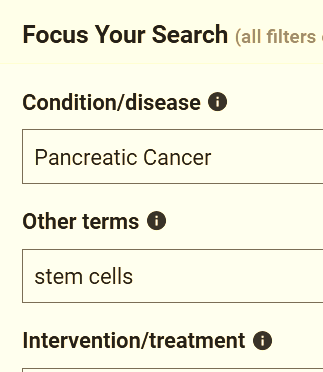Suppose a friend asks you if stem cells can help pancreatic cancer, a fatal disease, how would you even begin to answer something like that? (Maybe they saw an advertisement or heard this in a reddit post in some support group)
1. Their MD might know, if there is an approved stem cell (or other drugs) for this disease. They may not know if there are unapproved drugs or stem cells. But it would be a place to begin asking.
If the answer is “No”, or “I don’t know”, then….
2. I might wonder if there are unapproved drugs or cells. For a fatal disease, there might be the Right to Try, or medical tourism options that should be checked out. Obviously, this applies to serious illness where the doctor doesn’t have a good answer, because unapproved drugs or treatments are also an unknown risk. Figuring out the risk is part of the drug approval process.
3. Support groups are one place to begin researching. Find others with the condition and ask questions.
4. Or I might start with google.com or an AI like gemini.google.com. You could ask Gemini something like this:
“Do stem cells help pancreatic cancer”
And it may answer you, or give you some answer like this
Stem cells are currently being investigated as a potential treatment for pancreatic cancer, but there are no FDA-approved stem cell therapies for this disease yet. Some researchers believe that stem cells could be used to:
Regenerate healthy pancreatic tissue
Deliver anticancer drugs directly to tumor cells
Boost the body's immune response to cancerIf the AI refuses to help, for your own safety, you might try a less filtered AI like these:
https://chat.lmsys.org/
Be very skeptical of AI answers. Sometimes they make things up.
5. Ok, that example answer isn’t too helpful, but if there are “investigations” they should show up in scholar.google.com or clinicaltrials.gov.
6. I would definitely look at clinical trials. If someone is doing a clinical trial on stem cells and your disease, that is a very good sign that someone thinks that it might work.
Go to clinicaltrials.gov. And do some searches.
You will very quickly realize that there are many ways to say “stem cells”. There are Mesenchymal Stem Cells. (my favorite) There are embryonic stem cells. ESC MSC etc. But you have to start somewhere. There are multiple terms that might apply in medicine to the same disease or drug or treatment. So you will have to get familiar with the disease, the normal treatments, the normal terms, and the alternate terms If you don’t do that, you will likely miss some relevant trials.
In this example, your search might look like this:
You will get a lot of results to look through, and now you will realize something else. Most of the articles are unhelpful. You might find more helpful articles if you change “stem cells” to “mesenchymal stem cells” in this example. But that is part of the problem of doing this type of research.
Sorry, but this step will require a lot of reading, and you will have to master a few basic concepts about the disease to get reasonable search results and to be able to tell if a particular trial is helpful or not.
Perhaps you will find some good articles, like this one.
Individual Patient Expanded Access IND of Hope Biosciences First Blood Relative Allogeneic Adipose-derived Mesenchymal Stem Cells (HB-adMSCs) for Pancreatic Cancer
ClinicalTrials.gov ID NCT04087889
The drug for this submission is Hope Biosciences' allogeneic, first blood relative, adipose-derived culture-expanded mesenchymal stem cells (HB-adMSCs) for the treatment of a single patient with Pancreatic Cancer (PC). PC is an extremely infiltrative neoplasm that usually...But no results were posted, so did it work? Unfortunately, many clinical trials, in fact most of them, do not post any results. So how can you know whether stem cells might work for pancreatic cancer?
7. What you do is search for where they published their results (if they did publish). In this case we have a good unique looking drug name “Hope Biosciences allogenic” and maybe for searching you should add “mesenchymal stem cells”. You could throw in some researcher names or limit the search by approximate dates. And in this case, I found many pages of result papers where they tested this stem cell “drug” on Parkerson’s, rheumatoid arthritis, COVID, cardiomyopathy, etc. But I didn’t find a reference for pancreatic cancer.
That gap is a little hard to interpret. Did I just miss it? Did the trial never get completed, or didn’t work well enough to market it for that? The reasons are an unknown.
So… I added some new search terms, and eventually find where they published their phase I safety trial (they have to have one of these Phase I safety trials in the US, to test safety, and commonly test at a few different dose levels) :
However, I had trouble finding something published where Hope Biosciences mesenchymal cells were used for pancreatic cancer. While that's not promising because you might expect them to publish if it had been successful, you do still have options.
8. You can get the contact people from the clinical trials site, and contact them! Just email or call and ask them how it went. In this example, that is “Hope Biosciences” but often it is a doctor with a phone or email address.
9. You can also google with that company name, contact name, or drug name to see if there are web sites out there.
10. Remember to be skeptical. Science research goes back and forth. Some people respond differently. Eventually some consensus is reached, and that becomes the new “truth”. We all recall COVID where we saw the sausage getting made, and it can be frustrating. Well this type of research is like that.
Summary.
There are variations on this method. And there are many other places to look for information, but these are good ones. I believe the important points for any disease and any treatment type are to …
a) Ask your doctor. If the answer doesn't help you, for example if their only answer is a liver transplant, but you aren’t going to get one, then you don’t have to take that as the final word. I think we’ve all seen people almost die, because the doctor was out of ideas, too busy to search clinical trials for you, and sort of gives up on it. We’ve also seen people die when the doctor did every thing they knew how to do, but it just didn’t work.
b) Remember to be skeptical of any information. Evaluate the reputation of the source of the information. Animals are complex. So sometimes in biology, it takes some work to figure out whether something is true, true only for some people, ambiguous, true but risky, or just false.
c) See if there are clinical trials. Those indicate that someone thinks it may be true, but recall that sometimes these do not work out for safety or effectiveness reasons.
d) See if the clinical trial people published any results (often they do not). This would probably be searchable on scholar.google.com
e) Join a support group or twelve. See what other people have found out. Be skeptical.
Anyway, I hope that example was helpful, and if you have other ideas to help such a search, please feel free to comment.
Note: I am not a medical doctor, and this is not medical advice. I’m just relating some experiences for what it’s worth.
Here is the disclaimer that an AI suggested that I use:
Disclaimer: The information on this blog is for informational purposes only and is not intended to be medical advice. It is not a substitute for professional medical advice, diagnosis, or treatment. Always consult a qualified healthcare professional for medical advice and treatment. The author of this blog is not a licensed medical professional and does not claim to be an expert in any field of medicine.








Super helpful for me, thank you